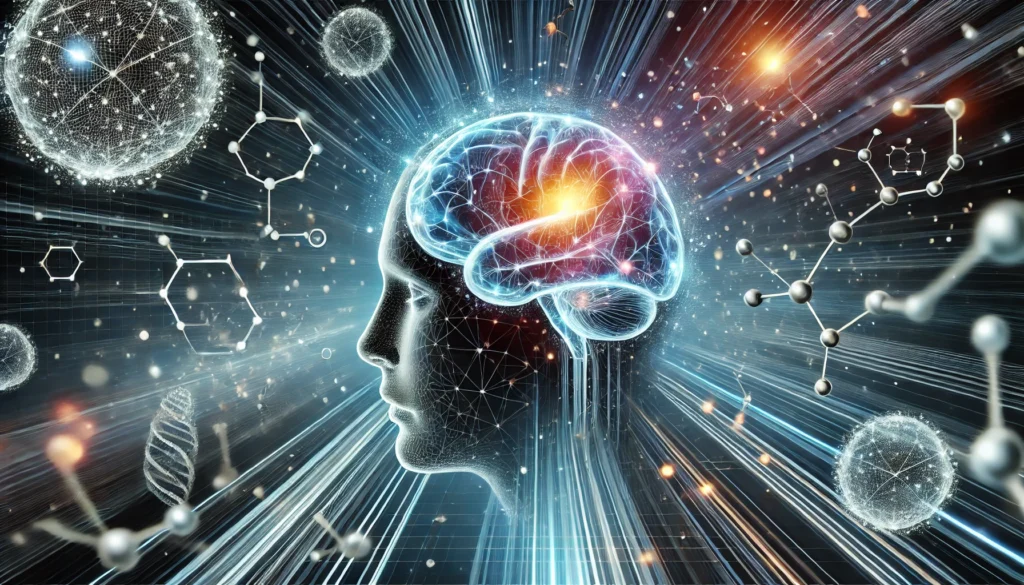The human brain is a marvel of nature, a complex organ that continues to develop throughout our lives. From the early stages of neural growth in the womb to the constant synaptic pruning and neuroplasticity observed in adults, brain development is a lifelong process.
You may also like: Top Apps to Boost Your Brainpower
The Basics of Neuroplasticity
Neuroplasticity refers to the brain’s ability to reorganize itself by forming new neural connections throughout life. This capability allows for adaptation to new experiences, learning, and even recovery from brain injuries. Understanding neuroplasticity is essential for anyone interested in brain optimization, as it underpins many cognitive enhancement strategies.
Neuroplasticity is not only a response to learning but also to environmental changes, physical injuries, and even emotional experiences. This dynamic capability means that the brain is continually evolving, altering its structure and function to better meet the demands placed upon it. Researchers are continually uncovering new insights into how neuroplasticity can be harnessed to aid recovery from trauma and enhance learning and memory.
Furthermore, neuroplasticity demonstrates that age is not a limiting factor in brain development. While younger brains tend to be more plastic, adults also exhibit substantial neuroplastic potential. This adaptability suggests that with the right strategies and interventions, individuals can continue to enhance their cognitive abilities well into later life.
The Role of Nutrition and Lifestyle
Nutrition plays a pivotal role in brain development and function. Omega-3 fatty acids, antioxidants, and vitamins like B12 and D3 are crucial for maintaining neural efficiency and mental performance. Additionally, lifestyle factors such as regular physical exercise, quality sleep, and stress management are vital for optimizing brain health.
A diet rich in these nutrients supports brain function and protects against cognitive decline. Omega-3 fatty acids, found in fish and flaxseeds, are essential for maintaining the fluidity of cell membranes, which is crucial for effective neurotransmission. Antioxidants, abundant in fruits and vegetables, help combat oxidative stress, which can damage brain cells over time.
Lifestyle choices significantly impact brain health. Regular physical activity increases blood flow to the brain, promoting the growth of new neurons and connections. Similarly, adequate sleep is crucial for memory consolidation and clearing brain toxins. Stress management through mindfulness or other techniques can lower cortisol levels, reducing its damaging effects on brain structure and function.
Genetic and Environmental Influences
Genetics and environment play intertwined roles in brain development. While genetics can predispose individuals to certain cognitive abilities or impairments, environmental factors such as education, social interactions, and exposure to enriching experiences can enhance or mitigate these genetic predispositions.
The interplay between genes and environment shapes each person’s unique cognitive profile. Genetic factors can influence brain size, the rate of neural growth, and susceptibility to neurological disorders. However, a stimulating environment can significantly enhance cognitive capabilities, illustrating the potential for intervention and optimization.
Understanding this balance is crucial for developing personalized strategies for cognitive enhancement. By recognizing genetic predispositions, individuals can tailor their environments and lifestyle choices to support optimal brain health. This personalized approach holds promise for maximizing cognitive potential across diverse populations.

Brain Optimization Techniques
With a foundational understanding of brain development, we can explore various brain optimization techniques designed to enhance mental agility and cognitive function.
Cognitive Training and Brain Exercises
Cognitive training involves structured activities aimed at improving specific brain functions. Brain training apps, puzzles, and memory games are popular tools that claim to boost mental agility. While the efficacy of such programs varies, consistent practice can lead to improvements in specific cognitive domains.
Brain exercises target areas like memory, attention, and problem-solving. For instance, memory games can enhance recall abilities, while puzzles like Sudoku can improve problem-solving skills and logical reasoning. These activities challenge the brain, encouraging the formation of new neural pathways and strengthening existing ones.
However, the effectiveness of cognitive training depends on the regularity and challenge level of the exercises. Programs that adapt to the user’s skill level and progressively increase in difficulty are more likely to yield significant cognitive benefits. Consistency is key, as the brain thrives on regular, varied stimulation to maintain and enhance its capabilities.
The Rise of Nootropics
Nootropics, often referred to as “smart drugs,” are substances that claim to enhance cognitive function, particularly executive functions, memory, creativity, or motivation, in healthy individuals. While some nootropics have shown promise in scientific studies, it’s important to approach these supplements with caution and consult healthcare professionals before use.
Nootropics can range from natural supplements like ginkgo biloba and caffeine to synthetic compounds like racetams. Each has different mechanisms of action, such as increasing neurotransmitter availability or enhancing blood flow to the brain. However, the long-term effects and safety of many nootropics remain under-researched, making professional guidance essential.
The popularity of nootropics is growing, driven by individuals seeking a competitive edge in academic and professional settings. Despite their potential, users should remain informed about possible side effects and interactions with other medications. A balanced approach, combining nootropics with healthy lifestyle practices, may offer the best cognitive benefits.
Mindfulness and Meditation
Mindfulness practices and meditation are powerful tools for enhancing focus, reducing stress, and improving overall mental performance. Regular meditation practice has been linked to increased gray matter density in areas of the brain associated with learning and memory, emotional regulation, and perspective-taking.
Mindfulness involves staying present and fully engaging with the current moment, which can improve attention and reduce anxiety. Techniques like deep breathing and body scanning help cultivate a mindful state, promoting relaxation and focus. Over time, mindfulness practice can lead to structural changes in the brain, enhancing cognitive and emotional resilience.
Meditation offers a structured approach to mindfulness, encouraging regular practice through guided sessions or silent retreats. Various forms of meditation, such as transcendental and mindfulness-based stress reduction, cater to different preferences and needs. Regular meditation practice can foster a calmer, more focused mind, enhancing overall cognitive performance.
The Role of Technology in Cognitive Enhancement
Technology plays an increasingly significant role in cognitive enhancement. From brain-training apps to virtual reality experiences, digital tools offer new avenues for cognitive development. These technologies provide interactive and engaging platforms for exercising the brain, catering to various learning styles and preferences.
Virtual reality, for instance, offers immersive environments that can enhance spatial awareness, problem-solving, and memory. Augmented reality applications can overlay information onto real-world settings, enhancing learning and retention. As technology continues to evolve, its potential for cognitive enhancement grows, offering innovative ways to engage and train the brain.
Despite their promise, technology-based approaches should be used judiciously. Balancing screen time with offline activities ensures a well-rounded approach to cognitive enhancement. Integrating technology with traditional methods like physical exercise and mindfulness can create a comprehensive strategy for optimizing brain health.

The Future of Cognitive Enhancement
As we continue to explore the science of advanced brain power, it’s essential to consider the future implications of these advancements.
Technological Innovations
Emerging technologies such as neural interface systems and brain-computer interfaces hold the potential to revolutionize cognitive enhancement. These technologies aim to bridge the gap between the human brain and digital devices, potentially allowing for unprecedented levels of mental performance and brain optimization.
Neural interfaces can enable direct communication between the brain and computers, offering possibilities for augmenting memory, learning, and even physical abilities. These systems could allow individuals to control devices with their thoughts, opening new avenues for accessibility and interaction with technology.
However, the development and deployment of these technologies raise important questions about privacy, security, and ethical use. Ensuring that these innovations benefit society without compromising individual rights requires careful consideration and regulation.
Ethical Considerations
With great power comes great responsibility. The pursuit of advanced brain power raises ethical questions about accessibility, fairness, and the potential for misuse. As scientists and technologists push the boundaries of cognitive enhancement, it’s crucial to engage in thoughtful discussions about the ethical implications of these advancements.
Equitable access to cognitive enhancement technologies is a primary concern. Without careful regulation, these advancements could exacerbate existing social inequalities, providing cognitive advantages only to those who can afford them. Ensuring that these technologies are accessible to all is essential for promoting fair and just societal progress.
The potential for misuse, whether intentional or accidental, also necessitates ethical guidelines and oversight. As cognitive enhancement technologies become more powerful, they could be used for harmful purposes, such as manipulating behavior or infringing on privacy. A proactive approach to ethical considerations can help mitigate these risks and ensure that cognitive enhancement technologies are developed and used responsibly.
The Role of Global Collaboration
Global collaboration is crucial for advancing cognitive enhancement technologies ethically and effectively. By sharing research, best practices, and resources, countries can work together to address the challenges and opportunities presented by these advancements.
International cooperation can facilitate the development of standardized regulations and ethical guidelines, ensuring that cognitive enhancement technologies are used safely and equitably worldwide. Collaborative research initiatives can also accelerate the discovery of new insights and innovations, benefiting individuals and societies globally.
Promoting global dialogue and collaboration can help build a shared understanding of the potential and limitations of cognitive enhancement technologies. By working together, countries can harness the power of these advancements to improve cognitive health and well-being on a global scale.
Practical Tips for Enhancing Brain Power
While the science behind advanced brain power is complex, there are practical steps that individuals can take to enhance their cognitive abilities.

Prioritize Sleep
Quality sleep is fundamental for brain health. During sleep, the brain consolidates memories and clears out toxins. Aim for 7-9 hours of restful sleep each night and establish a consistent sleep routine to optimize mental performance.
Further Reading:
Do Brain Supplements Actually Work?
Don’t buy into brain health supplements
Important Note: The information contained in this article is for general informational purposes only, and should not be construed as health or medical advice, nor is it intended to diagnose, prevent, treat, or cure any disease or health condition. Before embarking on any diet, fitness regimen, or program of nutritional supplementation, it is advisable to consult your healthcare professional in order to determine its safety and probable efficacy in terms of your individual state of health.
Regarding Nutritional Supplements Or Other Non-Prescription Health Products: If any nutritional supplements or other non-prescription health products are mentioned in the foregoing article, any claims or statements made about them have not been evaluated by the U.S. Food and Drug Administration, and such nutritional supplements or other health products are not intended to diagnose, treat, cure, or prevent any disease.


